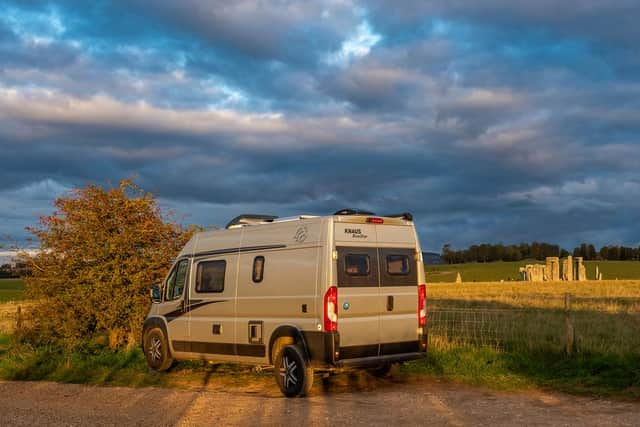New law could see motorhomes and campervans seized for overnight parking
and live on Freeview channel 276
New legal powers could see police seize campervans, caravans and motorhomes from wild campers who set up camp without permission.
The Police, Crime, Sentencing and Courts Bill 2021, which is currently going through parliament, would criminalise trespass and leave anyone who parks in spaces such as car parks, laybys or farmland open to fines, vehicle confiscation and even a prison sentence.
Advertisement
Hide AdAdvertisement
Hide AdOvernight camping without permission is already against the law in England and Wales but is rarely enforced as long as campers don’t cause a disturbance or damage. Currently, anyone camping on private land without the owner’s permission is guilty of trespass, which is a civil offence.


However, under the new Bill, the offence could be criminalised, with suggested punishments of fines up to £2,500, a three-month prison term, and confiscation of the offending vehicle.
In documents relating to the unauthorised encampments element of the Bill, the Home Office insists that the new powers are intended to only affect people residing on land who cause “significant damage, disruption or distress”.
However, campaigners fear that the powers could be used more widely to move on wild campers and others stopping temporarily at locations away from official campsites.
Advertisement
Hide AdAdvertisement
Hide AdAuthor and documentary maker Nick Rosen, who has written about off-the-grid living, believes the law could see police obliged to prosecute campers who aren’t causing a nuisance if a landowner makes a complaint.


He said: “There are upwards of 60,000 people living off-grid in mobile homes of various sorts in the UK. Some are taking a break from their normal life, while others live this way permanently.
"Many people don’t realise that the van-dwelling way of life is under direct threat from the bill, at a time when it has never been more popular and necessary. Action is needed urgently to raise awareness and stop this unintended consequence of the crackdown on protesters.”
As well as wild campers and the growing number of staycationers hiring campervans and motorhomes, it is feared the new powers would affect a growing number of people who have adopted the “VanLife” nomadic lifestyle or have chosen to live or work from their vehicle in the wake of the Covid pandemic.
Advertisement
Hide AdAdvertisement
Hide AdThe proposed changes are part of a wide-reaching Bill that also includes proposals to imposing life sentences on killer drivers and new powers to crack down on public protest. The Bill’s changes have been branded Draconian by some human rights campaigners who claim they would limit the right to legitimate protest.
Under existing laws, police can only place restrictions on protests if there is a threat of “serious public disorder, serious damage to property or serious disruption to life in the community”.
However, under the new Bill, police chiefs would be able to set noise limits and impose a start and finish time on protests. These rules would also be applicable to a protest of a single person and failure to comply could see protestors fined up to £2,500.